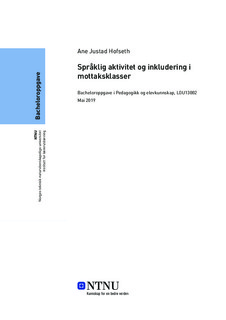| dc.contributor.advisor | Strand, Gro Marte | |
| dc.contributor.author | Hofseth, Ane Justad | |
| dc.date.accessioned | 2019-08-23T14:08:37Z | |
| dc.date.available | 2019-08-23T14:08:37Z | |
| dc.date.issued | 2019 | |
| dc.identifier.uri | http://hdl.handle.net/11250/2610381 | |
| dc.description.abstract | I flere kommuner i Norge i dag har det blitt opprettet mottaksklasser for å ivareta og tilrettelegge for nyankomne elevers behov for språklig, faglig og sosial opplæring. Knyttet til en slik modell kan det oppstå utfordringer, spesielt når det kommer til inkludering. I denne oppgaven har jeg derfor valgt å se nærmere på hvordan lek og økt språklig aktivitet i mottaksklasser kan bidra til å stimulere inkludering hos elevene. Problemstillingen jeg har jobbet ut fra er:
Kan lek-aktiviteter bidra til økt språklig aktivitet i mottaksklasser, og hvordan kan dette stimulere inkludering for elevene?
For å svare på problemstillingen har jeg tatt i bruk tidligere forskning og relevant teori knyttet til lek, inkludering og fellesskap, språk, tilpasset opplæring og lærerens rolle. Teorien vil bli knyttet opp mot empirien, der jeg har samlet inn analysegrunnlag gjennom observasjon. Empirien ble samlet inn gjennom observasjon av en undervisningstime som inkluderte lek- aktiviteter og en undervisningstime som baserte aktivitetene på tavleundervisning. Analysegrunnlaget er både kvalitativt og kvantitativt, da jeg brukte både avkrysningsskjema og feltnotater ved observasjonen.
Resultatene viste at ved inkludering av lek-aktiviteter økte den språklige aktiviteten i mottaksklassene. Elevene rakk oftere opp hånda, de pratet oftere uten lov og spørsmålene læreren stilte førte oftere til videre diskusjoner og samtaler mellom elevene og læreren. Dette kan tyde på at lek i undervisningen kan bidra til at elevene, gjennom økt språklig aktivitet, blant annet øker den kulturelle kompetansen og utvikler felles verktøy som kan bli benyttet i sosiale samhandlinger. Dette kan være faktorer som stimulerer elevenes inkludering. | |
| dc.description.abstract | In several municipalities in Norway today, reception classes have been established to facilitate the newly arrived pupils' need for linguistic, academic and social education. Associated with such a model, challenges may arise, especially when it comes to inclusion. In this paper, I have therefore chosen to examine how play-activities and increased oral activity in reception classes can help stimulate inclusion for the students. I will examine this by answering the following question;
Can play-activities contribute to increased oral activity in reception classes, and how can this stimulate inclusion for the students?
To answer this, I have used previous research and relevant theory related to children’s play, inclusion, language, adapted education and the role of the teacher. The theory will be linked to the empirical work, which I have collected through observation. The base for the analysis was collected through observation of a lesson that included play-activities and a lesson that conducted the activities using the blackboard. The analysis basis is both qualitative and quantitative, because I used both a check chart and field notes for the observation.
The results showed that the inclusion of play-activities increased the oral activity in the reception classes. The students raised their hand more often, they talked more without permission and questions asked by the teacher often led to further discussions and conversations between the students and the teacher. This indicates that play-activities, through increased oral participation, can contribute to increased cultural competence for the pupils. It also suggests that play-activities can lead to the development of collective tools for social interaction between the pupils. These are factors that can stimulate inclusion. | |
| dc.language | nob | |
| dc.publisher | NTNU | |
| dc.title | Språklig aktivitet og inkludering i mottaksklasser | |
| dc.type | Bachelor thesis | |
